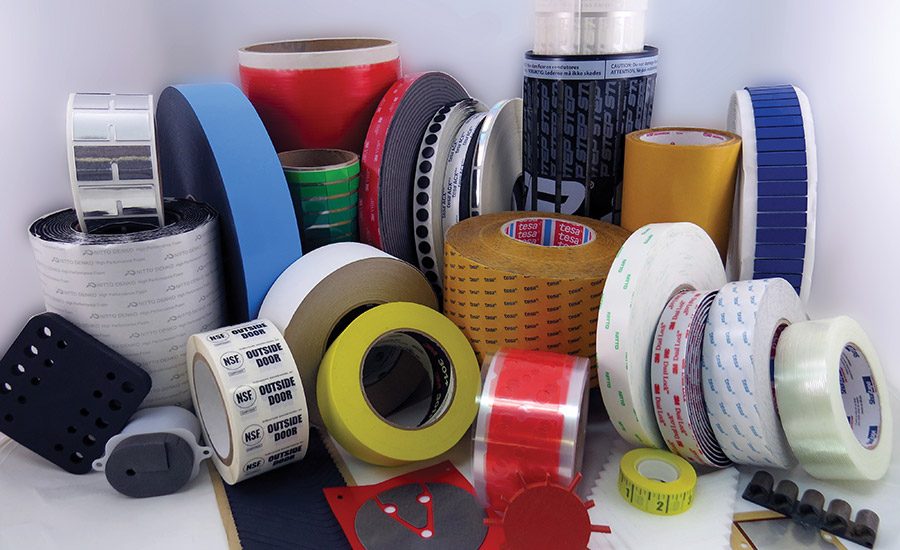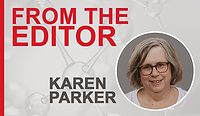Sourcing, specifying, and purchasing adhesive tapes and materials can be a stressful process. You have literally millions of different tapes to choose from, and finding a solution for your application can be time consuming. Full-service converters can be your ideal partner to save sourcing time, lower material costs, reduce SKUs, increase production output and enhance the end product.
Reducing Material Costs
Tape converters help reduce material costs through bulk purchasing and stocking jumbo rolls of adhesive tape. The width and length of the tape can be quickly customized to your production or final good specifications. Thus, converters can help to:
• Save sourcing time. Converters work with top manufacturers in the industry, who rely on their converter partners to transform standard tapes into production friendly customized parts.
• Boost production output and save labor costs. The converter can analyze your application methods and needs to develop the ideal format for both delivering and applying the tape. For example, a custom die-cut piece of masking tape can take much less time to apply on the production line than hand masking a hard-to-get-to area.
• Add value. The reduced labor time and costs can increase your margin on the final goods by cutting down on the overall costs associated with each product.
• Reduce SKUs. If you are supporting multiple locations, a tape converter can consolidate your product catalog, making sure you’re not ordering two similar tapes from two different distributors. A converter can also help consolidate your inventory through the multiple tapes used for one function by laminating the tapes together and creating custom cuts and pieces.
Working with a Converter
Sourcing inquiries at the converter level allows for finding the right product for your particular application instead of being locked into one particular brand. Look for the converters that work with, and are certified by, all major adhesive tape brands. Your converter should offer you samples of two to three of the most-suited products, no matter the brand, to allow you to make the final decision based on your internal test results.
After sourcing the right adhesive, the converter can make sure that the material is in optimal working form for your application. Full-service converters provide everything from printing and laminating to slitting and die cutting. The converter should also offer a range of added-value services, such as design assistance, prototyping, application engineering and quality processes to ensure a cost-effective solution.
Identifying the correct method to apply your tape is key in being able to fully use the custom components of the tape. The converter should also address the dispensing and application processes for your new product. This will allow the converter to either tailor the piece to your current process or develop new processes and/or equipment to streamline the application and dispensing process.
Purchasing
While many converters sell direct to end users, they often sell through packaging distributors, market-focused resellers and integrated suppliers. This gives you the power to choose your own direct supplier. Many times, companies prefer to integrate with a trusted distribution partner that offers quick delivery times or consigned inventory. In this case, the company should request that the converter sell to their distributor or integrated supplier.
In addition, buying custom parts from your integrated supplier or packaging distributor may be more cost effective than adding the converter as an additional vendor. Before making the decision to buy direct, consider the proportion of specialty converted tape products you purchase to standard commodity tapes, and the amount of integration and supply channel efficiencies you have set up with your packaging supplier. Because they buy in volume and provide valuable services to the end user, converters generally provide sizeable discounts to your distributor.
The most efficient supply chain is not always the one with the least number of suppliers, but rather the one that meets your quality and service demands in the most cost-efficient manner. For example, the manufacturers of adhesive tape cannot actually cut the tape as economically as a tape converter. Therefore, eliminating the converter from the chain actually adds material costs that could force you to utilize inefficient standardized tapes.
Working with Distributors and Converters
Most manufacturers have only two options when sourcing and purchasing adhesive tapes: the converter and the packaging distributor. Following are some ways to combine both into a more efficient channel:
• If all your tapes are used in non-critical warehousing functions, a packaging distributor can handle your standard tape needs.
• If any of your tapes become part of your final goods or are used in the production process, a full-service converter should be involved.
• If you already have supply channel efficiencies with a packaging distributor, your production team should work with a converter to implement cost-saving ideas.
• Ask your converter to sell your specialty tapes to your stocking distributor. They should only charge you for the cost of the services that each of them provides, with no duplicated costs.
By following these processes, you can create an efficient supply channel. The manufacturer produces bulk jumbos, the converter analyzes your production needs and customized parts for your particular process, and your integrated partner manages inventory logistics. Managing these three components is the key to supply channel success and increasing your process efficiencies. ASI
For more information, visit www.budnick.com.




